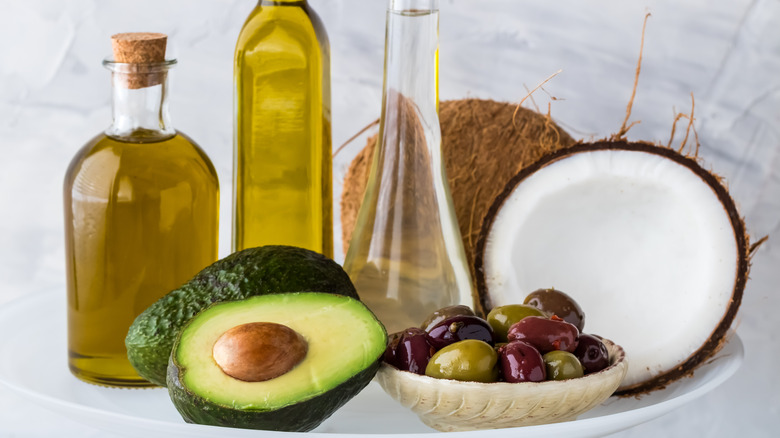Why Fatty Fruits Are Coming Into The Superfood Spotlight
You might not think about fat when you think of fruits, but there are some fruits that contain it. Among them are avocados, olives, and coconuts. According to Livestrong, most of the fat in these fruits is the healthy, monounsaturated kind. The American Heart Association recommends making most of the fat in your diet monounsaturated or polyunsaturated, as opposed to saturated or trans fats. Monounsaturated fats are good for heart health because they can help reduce the amount of cholesterol in your blood.
Avocados are known as a superfood because in addition to containing healthy fat, they offer several other key nutrients, including folate, potassium, magnesium, and vitamins B2, B3, B5, B6, C, E, and K. In addition, one avocado also provides 14 grams of fiber and 4 grams of protein, per Healthline. Now, new research shows there is even more of a reason to add avocados to your diet.
Avocados can reduce the risk of heart disease
A 2022 study published in the Journal of the American Heart Association showed that eating at least two servings of avocados a week proved to be beneficial for the heart. In fact, eating one half of an avocado twice a week lowered the risk of cardiovascular disease by 16% and coronary heart disease by 21%. During the study, participants replaced one serving of butter, margarine, mayonnaise, eggs, yogurt, cheese, and processed meat with one serving, or one-half, of an avocado. Researchers observed 62,225 healthy women between the ages of 30 and 55 and 41,701 healthy men between the ages of 40 and 75 over the course of 30 years.
The study is significant because it is one of the largest studies that has examined the correlation between avocados and heart health. While researchers noted that higher amounts of plant-based fats improved diet quality and lowered risks for cardiovascular disease for most people, it did not lower the risk of stroke. That said, researchers recommend adding the fatty fruit to the diet to reduce risk factors for heart disease.


